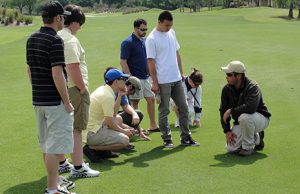Changes to Florida Pesticide Applicator Exam Testing Sites and Florida Statute Affecting Pesticide Applicators
Authored by Ethan Carter & Julie McConnell
Florida Statute Chapter 482 Changes
July 1, 2024, marked the implementation of new Florida Statutes affecting pesticide applicators in the landscape industry. The full Florida Department of Agriculture and Consumer Services (FDACS) memorandum can be accessed here https://ccmedia.fdacs.gov/content/download/116156/file/482_memo_24.pdf
Below is a recap of major changes affecting pesticide applicators in the structural/landscape categories (please see memo above for all F.S. Chapter 482 changes):
- Pest Control Operators – renewal date will be based on 1-year anniversary of issue date rather than date set by FDACS
- Pest Control, Special ID Card for Fumigation, Limited Commercial Landscape Maintenance, Limited Lawn & Ornamental, Limited Structural, and Limited Wildlife
- licenses and certificates issued after July 1, 2024, will require reexamination to recertify IF not renewed by CEUs within 60 days of expiration date
- false statements on applications, cheating on exams, or violated exam procedures are subject to disciplinary actions
- Limited Commercial Landscape Maintenance
- 6-CEU pre-requisite for certification is eliminated
- Products with no signal word can be used in addition to “caution” products with the caveat that “warning” or “danger” are not designated signal words on the product
- Driveways, sidewalks, and patios added to plant bed application sites
- Spray tank size removed (formerly 3-5 gal) but still excludes the use of power equipped sprayers and limited to portable handheld or backpack sprayers
Changes to Testing Sites
UF/IFAS Extension has historically been the primary pesticide exam administer on behalf of the Florida Department of Agriculture and Consumer Services (FDACS), but that contract will be ending soon. There will be a three-phase transition from UF/IFAS offering exams to FDACS assuming these tasks over the next 18 months.
Phase I
Through December 30, 2024, paper (scantron) or online exams on designated pesticide exam laptops can be given by an approved exam administrator at a UF/IFAS Extension Office or Research & Education Center. Exams will be available as part of educational workshops, scheduled group exams, or by appointment.
EverBlue online exam proctoring will continue to be available for applicators who wish to take exams on their own equipment at their convenience for an additional fee. This service has been in place for several years and is still an option.
Phase II
As of December 31,2024 paper exams administered by UF/IFAS will no longer be an available option at County Extension Offices.
All exams will be administered electronically through the following two platforms from January 1, 2025, through September 30, 2025:
1) Designated pesticide laptops at select UF/IFAS Extension Offices by appointment only. Not all Extension Offices have this equipment available, so you must check with your local office and find out their testing schedule and capacity.
2) Testing with your own equipment using the private EverBlue platform (additional fees required).
Phase III
In October 2025, the UF/IFAS Extension pesticide testing computers will no longer be compatible with pesticide exam software. This option will be eliminated and applicators will need to schedule exams with private exam proctoring companies designated by FDACS.
FDACS is currently soliciting bids from professional testing services to provide both remote proctored exams (those you take at home) and physical test centers distributed throughout the state. The timing, availability, and provider of these services are to be determined by FDACS and their contractual team. As more information becomes available it will be shared.
In order to help stakeholders with this transition, the UF/IFAS Extension Panhandle Agriculture and Horticulture Teams will be teaching a greater number of fall pesticide exam prep classes than usual to allow applicators the opportunity to test by paper exam prior to their discontinuation in December 2024.
Some of these classes offer CEUs or testing same day and others do not – please consult the lists below for specifics.
Exam Prep and Same Day Exams with CEUs
- August 20, 2024 – Crestview Limited Commercial Landscape Maintenance (LCLM) Exam Prep followed by testing
- September 17, 2024 – Crestview Limited Lawn & Ornamental Exam Prep followed by testing
- November 19, 2024 – Crestview Limited Commercial Landscape Maintenance (LCLM) Exam Prep followed by testing
Exam Prep Class only (No CEUs – testing different day)
Testing only (no class – any pesticide exam type)
- September 26, 2024 – Chipley pre-register by sending name and exam voucher number to Julie McConnell juliebmconnell@ufl.edu
- October 30, 2024 – Chipley pre-register by sending name and exam voucher number to Julie McConnell juliebmconnell@ufl.edu
Continuing Education (CEU) Classes (2 Core plus 2 LCLM, LLO, Commercial L&O, O&T, or Private Ag)
- October 3, 2024 – Pesticide Applicator 4-Hour Continuing Education Class, Chipley
- November 6, 2024 – Fall Pesticide Applicator 4-Hour Continuing Education Class, Chipley
For more information, contact your local Extension Office.
Florida Certified Horticulture Professional Training
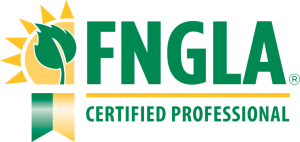 No previous experience or accreditation it required to be a landscaper in the state of Florida. So when homeowners are searching for service providers, it is important that they question potential companies about their skills. One good measure is completion of voluntary certifications such as the Florida Nursery, Growers and Landscape Association (FNGLA) Certified Horticulture Professional (FCHP). The FCHP program has been the industry’s standard for measuring horticulture and landscape knowledge since 1984. The training is also useful for property managers, homeowner associations, retail garden center employees, or anyone that wants to know more about Florida’s plants and their care.
No previous experience or accreditation it required to be a landscaper in the state of Florida. So when homeowners are searching for service providers, it is important that they question potential companies about their skills. One good measure is completion of voluntary certifications such as the Florida Nursery, Growers and Landscape Association (FNGLA) Certified Horticulture Professional (FCHP). The FCHP program has been the industry’s standard for measuring horticulture and landscape knowledge since 1984. The training is also useful for property managers, homeowner associations, retail garden center employees, or anyone that wants to know more about Florida’s plants and their care.
Plants are complex and variable living things that range from microscopic to the largest of living organisms. With steady population growth in the state of Florida, environmental damage risks created by the use of improper products and practices has continually risen. State and federal natural resource protection agencies have restricted certain horticultural practices including fertilizer and pesticide application. It takes scientific knowledge to properly maintain lawns and landscapes, not just a “green thumb” in order to keep plants healthy while reducing contamination to the soil, air and water that we all need.
The Florida Certified Horticulture Professional training covers 16 areas, including identification, fertilization, irrigation, pest management, safety and business practices. Lecture and hands-on activities are utilized at each session. The 60-hour course will enhance anyone’s knowledge and will provide the basis for professionals to deliver a skilled service to clientele. The course is available in-person or virtually via Zoom.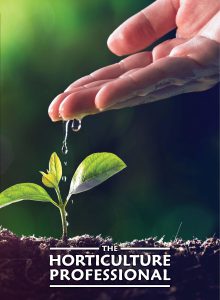
If you are a green industry worker or a concerned citizen interested in attending a FCHP preparatory course, there is an opportunity coming up in Crestview. Beginning Thursday, January 6, 2022 and continuing for 8 weeks to February 24, 2022, the Okaloosa County Extension office will be providing training for $185, which included the newest hard copy manual and plant identification book. Contact Sheila Dunning, 850-689-5850, sdunning@ufl.edu for more information.
For more details and to register go to: https://www.eventbrite.com/e/florida-certified-horticulture-professional-fchp-training-tickets-215748017127
Gulf States Horticulture Expo 2022
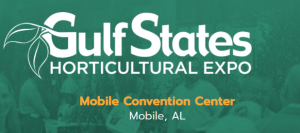 Here in Northwest Florida, finding horticultural supplies and plant material available locally is a challenge. Due to our location, looking to the neighboring states is very practical. A great resource to fill these needs is The Gulf States Horticultural Expo (GSHE) trade show and education event for green industry professionals will be held in Mobile in January, 2022. Attendee profiles include wholesale growers, landscape professionals, retailers, manufacturers, and distributors. Produced in partnership between the Alabama Nursery & Landscape Association (ALNLA), the Mississippi Nursery & Landscape Association (MNLA), and the Louisiana Nursery & Landscape Association (LNLA), the Expo’s goals are to increase commerce, networking, and professional development among the green industry and allied suppliers. Since the first Expo in 1999, GSHE has grown to become THE premier winter trade show of the South.
Here in Northwest Florida, finding horticultural supplies and plant material available locally is a challenge. Due to our location, looking to the neighboring states is very practical. A great resource to fill these needs is The Gulf States Horticultural Expo (GSHE) trade show and education event for green industry professionals will be held in Mobile in January, 2022. Attendee profiles include wholesale growers, landscape professionals, retailers, manufacturers, and distributors. Produced in partnership between the Alabama Nursery & Landscape Association (ALNLA), the Mississippi Nursery & Landscape Association (MNLA), and the Louisiana Nursery & Landscape Association (LNLA), the Expo’s goals are to increase commerce, networking, and professional development among the green industry and allied suppliers. Since the first Expo in 1999, GSHE has grown to become THE premier winter trade show of the South.
Educational Opportunities:
Awareness of pest problems present in neighboring states helps Northwest Florida green industry personnel develop more effective scouting programs. On Wednesday, January 19, 2022 researchers, professors and faculty from well-known Southern universities and colleges across the United States will present valuable information during the Pest Management education session. You can earn up to 8 Florida CEUs in multiple categories including all the Lawn & Ornamental, Demo & Research, Forest Pest, Natural Areas, Ag Tree, Private Applicator, and Right-of-Way. Please note that no CORE CEUs will be available at this event.
If learning more about business management or new plant varieties appeals to you, plan on attending the Business and Culture or Plant Conference session. Jeff Manus from the University of Mississippi delivers a two-part session on Weeders to Leaders during the business training. Speakers from Southern Living, Bracy’s Nursery, Proven Winners, Louisiana State University, Ball Horticultural Company and Plant Development Services will introduce new and exciting plant selections for 2022 during the plant conference.
If landscape design is your passion, spend all day Wednesday through Friday with Richard Ludwig and Bill Slack in the Landscape Design sessions. Learn the fundamentals of profitability, color graphics and how to create the ultimate landscape design over the three days.
For more information and to register go to: https://www.gshe.org/schedule.cfm
UF/IFAS Gulf Coast Turfgrass Expo & Field Day Set for June 16, 2021
We’re back! After the COVID-19 hiatus, the Gulf Coast Turfgrass Field Day & Expo returns to the normal third Wednesday in June time slot.
Join us June 16, 2021 for a COVID-19 friendly, in-person field day. Due to COVID-19 protocols, ALL ATTENDEES MUST PREREGISTER before June 15th. There will be NO on-site registration, so get your ticket now!
ATTENDEE REGISTRATION: Choose ONLY one of the four ticket options:
- Field Tour, Scouting Insects, Spill Drills
- Field Tour, Scouting Insects, Natural Pesticides
- Field Tour, Spill Drills, Natural Pesticides
- Field Tour ONLY
MORNING RESEARCH FORUM – Everybody is ready to get back to “normal” and so are the University of Florida scientists who are coming to the Turfgrass Field Day in full force – even a few you’ve likely never met in person! Change abounds and this year’s field day is no different. The line-up this year will have four focus areas and will allow greater time for interaction with the researchers.
Future Urban Landscapes – water quality and quantity concerns are major drivers leading to changes in what future landscapes will look like.
- Agustin Boeri, Graduate Research Assistant
- A.J. Reisinger, UF Soil and Water Scientist
- Mark Lusk, UF Soil and Water Scientist
- Michael Dukes, UF Irrigation Specialist
- Adam Dale, UF Turf Entomologist
- J. Bryan Unruh, UF Turf Specialist
Pest Management – pests continue to create challenges when managing turf.
- Billy Crow, UF Turf Nematologist
- Adam Dale, UF Turf Entomologist
- Phil Harmon, UF Turf Pathologist
- Pawel Petelwicz, UF Turf Weed Scientist
Turfgrass Breeding & Cultivar Development – tremendous effort is underway to bring improved turfgrasses (color, quality, reduced water and nutrition) to the market.
- Kevin Kenworthy, UF Turf Breeder
- J. Bryan Unruh, UF Turf Specialist
- Chase McKeithen, UF Turf Biological Scientist
Cultural Management – research on how to better manage turf.
- Jason Kruse, UF Athletic Turf Specialist
- Marco Schiavon, UF Turf Specialist
- J. Bryan Unruh, UF Turf Specialist
VENDOR EXPO – This year’s vendor expo will be an open air “tail-gate” style event to allow for social distancing and COVID-19 safety protocols. Vendors will be stationed in the grassy areas around the perimeter of the turfgrass research plots. Attendees will have opportunity to visit before, during, and after the research tours.
A limited number of tables and chairs will be available for the vendors. Vendors should plan to bring a pop-up tent if you have one!
Please note: To see all ticketing options please do the following: Upon entering Eventbrite site using link below, click “Tickets” link and then “I want to get tickets” “As an individual” to see all ticketing options.
LUNCH – BBQ Buffet lunches aren’t the most COVID friendly so we are changing up the menu and the venue a bit. Box lunches will be provided out on the research plots. Grab your lunch and find a shade tree, huddle under a vendor tent, or head back to your vehicle for a bit (you may want to turn your A/C on to cool off!).
AFTERNOON PESTICIDE LICENSE CONTINUING EDUCATION – Three sessions will be offered this year. All three classes will be available from ~ 12-1 and 1-2; each class will repeat with different audience so attendees can choose to get 2 different core or 1 category and 1 core CEU.
Scouting for Insects in the Landscape. This session will focus on identification of signs and symptoms of common insect pests in landscape plants. 1 Category CEU O&T, LCLM, LLO, Comm L&O will be requested for this session.
Spill Drills. Do you know what to do in an emergency? This session will cover multiple spill scenarios and what action needs to be taken to prevent injury and environmental harm. 1 Core CEU will be requested for this session.
Natural Pesticides for the Landscape. Many property owners are interested in using “natural” or low-risk pesticides but are they really effective? This session will discuss pesticide products that are labeled as natural and/or organic. 1 Core CEU will be requested for this session.
REGISTER NOW: https://2021gcturfgrassexpo.eventbrite.com
Empty Fields? Time to tackle turfgrass improvement projects!
Turf pros, you have fought for years to try to get enough downtime on your sports turf to really work on making big improvements. Now, with school and city leagues cancelled, is the perfect time. The grass has
greened up and is needing mowing. The soil temperatures are up. We have gotten a decent rain with more predicted. So, plan to make some of those much-needed improvements in May.
If you haven’t submitted soil samples, start with getting that baseline information. All the labs are open and working, including UF. Sampling kits and instructions are available at: https://soilslab.ifas.ufl.edu/ESTL%20Tests.asp.
Get out there and fix all the irrigation system imperfections. Knowing the water output and uniformity can make all the difference in the turf appearance and response to fertilizers, not to mention reducing disease pressure. Make sure you have head-to-head coverage, not the “almost” head-to-head coverage that cheats a few feet here and there. Calibrate each zone to determine how much time it takes to deliver ¾ inch of water. Watch this video for more information: https://www.youtube.com/watch?v=W_wn-hwLNtg
Take this time to accurately measure the areas that will need fertilizing and calibrate your spreader to you and the product. Set the application schedule for the rest of the year. Accomplishing this now when you’re not so pressed for time will pay off. Remember with rotary spreaders, fertilizer distribution is not uniform. More granules fall in the middle of the pass than along the outer edges. To achieve uniformity, check that the tire is just inside the track from the previous pass and that the granules are reaching the previous track. Additionally, apply in two directions.
How about reducing compaction and improving the overall soil conditions? That’s the one project you’ve been wanting to do for many seasons. Physical penetration of the soil improves air, water, and nutrient movement within the root zone. This is especially important for high traffic areas. A hollow tine, or core, aerator pulls soil cores from a 2-6 -inch depth. Cores can be removed or dried on the surface and reincorporated using a drag mat. If thatch is an issue, consider vertical mowing to cut into the turf runners and loosen the dead tissue layer. Then, rake, rake and rake! The grass will look rough for a while during the recovery but will be much healthier in the long run.
When you get your soil test results back, they will identify nutrient deficiencies and recommend lime and fertilizer for the year. Lime should only be applied in accordance with the recommendations on soil test results. Over-application can take years to correct. Split applications of the annual required rate will allow for more adjustment. Nitrogen influences color and many growth factors. Application rate recommendations are based on research-driven requirements for each grass type. However, nitrogen comes in quick-release and/or slow-release. Quick release products are water soluble and cause a turf response in a week or less but can evaporate or burn. Application should always be followed by ¼ inch of irrigation to get the most benefit. Slow release products are water insoluble and provide a gradual, consistent turf response over a 3-10-week period. They require warm, moist soil with microbes in order to release nitrogen. Most of the available fertilizers will have a combination of both quick and slow release components. That way there is an immediate green up with long lasting color. Bermudagrass needs 0.5-1 pound of soluble N/ 1,000 sq. ft. to get going in the spring.
You’ve been saying, “We need to get some of these big tasks done, but just can’t find the time when no one is on the field.” Here’s your chance.
COVID-19 Update April 2, 2020: What Does the Office of the Governor Executive Order 20-91 Mean for Landscape Companies?
Following the issuance of the Governor’s Executive Order 20-91 we have had a lot of questions from the Green Industry concerned about their status as essential employees. As noted in the excerpt below from the State of Florida Office of the Governor Executive Order Number 20-91 (Essential Services and Activities During COVID-19 Emergency) landscapers are included under the Public Works and Infrastructure Support Services Category.
PUBLIC WORKS AND INFRASTRUCTURE SUPPORT SERVICES
-
Workers who support the operation, inspection, and maintenance of essential public works facilities and operations, including bridges, water and sewer main breaks, fleet maintenance personnel, construction of critical or strategic infrastructure, traffic signal maintenance, emergency location services for buried utilities, maintenance of digital systems infrastructure supporting public works operations, and other emergent issues.
-
Workers such as plumbers, electricians, exterminators, builders, contractors, HVAC Technicians, landscapers, and other service providers who provide services that are necessary to maintaining the safety, sanitation, and essential operation of residences, businesses and buildings such as hospitals, senior living facilities, any temporary construction required to support COVID-19 response.
-
Workers who support, such as road and line clearing, to ensure the availability of and access to needed facilities, transportation, energy and communications.
-
Support to ensure the effective removal, storage, and disposal of residential and commercial solid waste and hazardous waste, including landfill operations.
-
Workers who support the operation, inspection, and maintenance of essential dams, locks and levees.
-
Workers who support the inspection and maintenance of aids to navigation, and other government provided services that ensure continued maritime commerce.
Florida Department of Agriculture and Consumer Services (FDACS) recommends that all essential employees carry a letter from their employer that describes their role as an essential employee.The Governor’s Office has provided a template that can be found at the following link. Download and modify to fit your business role. http://blogs.ifas.ufl.edu/nfrecsv/files/2020/03/2020-04-01-Essential-Worker-Movement-Letter-DRAFT-2.0-2.pdf
Please be mindful that although the landscape industry can continue working, it is imperative that all citizens follow CDC recommendations to prevent the spread of COVID-19. These can be found here https://www.cdc.gov/coronavirus/2019-ncov/prevent-getting-sick/prevention.html
In addition to this resource, consider incorporating recommendations from The Urban Ag Council of Georgia where appropriate.
*Stagger start times so that each manager will only work with their team. No more than 5-person crew.
* Employees are required to keep 8-foot separation between colleagues and/or any other people. Focus on social and work distancing.
*No more than 2 people per single cab truck and 4 people per crew cab truck (exceptions are made for employees who need to use personal vehicles to accomplish this).
*Wear dust masks when in vehicle and outside.
*Trucks are to be thoroughly cleaned at the end of every day.
*Crew leaders must clock in their crew. Do not pass phone around for them to clock-in.
*Daily – every employee (office and field) is screened with questions before starting work.
- Do you currently have a fever? Or have you had a fever in the last week?
- Do you have a cough?
- Do you have shortness of breath?
- Do you have vomiting/nausea?
- Do you have diarrhea or stomach issues?
- Have you been in contact with anyone with a confirmed or suspected case of the COVID-19?
Any employee that answers yes to any question will be asked to return home and HR will be notified to receive additional instructions.
Please be safe and let us know if we can assist in any way.
Your UF/IFAS Panhandle Commercial Horticulture Team
Bay – Julie McConnell juliebmcconnell@ufl.edu
Escambia – Beth Bolles bbolles@ufl.edu
Okaloosa – Sheila Dunning sdunning@ufl.edu
Santa Rosa – Matt Lollar mlollar@ufl.edu
Walton – Evan Anderson eanderson350@ufl.edu
Washington – Matt Orwat mjorwat@ufl.edu
Calhoun – Daniel Leonard d.leonard@ufl.edu
Leon – Mark Tancig tancig00@ufl.edu
Protecting Yourself from Heat Injury
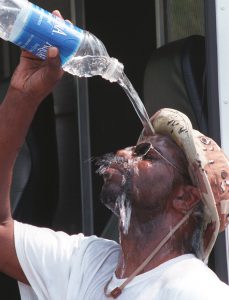
Kenny Stokes, a courier for the University of Florida’s Institute of Food and Agricultural Sciences, battles summer heat the old fashioned way. Stokes, whose van has no air conditioning, cooled off after his mid-morning deliveries. With temperatures hovering around the century mark and a heat index of 108, he decided to take matters into his own hands.
Triple digit heat indexes make it more than unpleasant to work outside, it can be life threatening. Understanding how to prevent and recognize heat injury is critical for people who work outdoors in Florida.
For horticulture and agriculture professionals who also apply pesticides, recognizing heat injury can be further complicated by the similarities of symptoms to pesticide exposure.
To learn more about preventing workplace heat related illness, read the article below by UF/IFAS Extension Hillsborough County Commercial Horticulture Agent Susan Haddock.
What Landscape Professionals Need to Know About Avoiding Heat Stress
Weed Control in the Landscape – Alternatives to Glyphosate Workshop – May 23
Are you looking for more selective herbicide options for annual beds and around shrubs and trees? The Santa Rosa County Extension Office will be hosting guest speaker Dr. Chris Marble from the UF/IFAS Mid-Florida Research & Education Center on Thursday, May 23. Dr. Marble is a Nationally Renowned Weed Scientist who has published numerous research and extension publications.
2 FDACS CEUs available in LCLM, Limited Lawn & Ornamental, Commercial L&O, O&T, Natural Areas, ROW, or Private Ag.
Pre-registration fee is $15, or $20 registration at the door the day of the event (includes lunch and resources). Pre-register online at Eventbrite Ticket or bring cash, check, or money order to the Santa Rosa County Extension Office, 6263 Dogwood Dr., Milton, FL before May 23. For additional questions, please contact Matt Lollar at mlollar@ufl.edu or 850-623-3868.
SCHEDULE
9:30 Registration & Welcome
9:45 Presentation Begins
11:30 Question & Answer w/Dr. Marble
11:45 Evaluation & CEUs
12:00 Lunch & Discussion on Glyphosate Registration
12:30 Adjourn
Fertilizer Label Requirements for Urban Turf (Lawns)
As of January 2015 the labels on fertilizer bags have changed. Florida Rule 5E-1.003 required fertilizer manufacturers to modify their package recommendations and wording.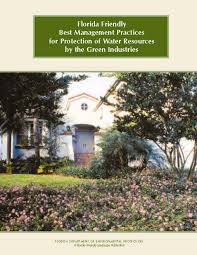
“Specialty fertilizers” was one of the more significant changes. This included packages that weigh 49 pounds or less and are labeled for home (residential) lawn use. The new labeling requirement for fertilizers labeled for use on urban lawns included that these products must be no phosphate or low phosphate. “No phosphate” fertilizers will be expressed as zero in the guaranteed analysis. “Low phosphate” fertilizers typically have 2% when labeled for residential lawns. Additionally, the recommended application rate must not exceed 0.25 lbs. P2O5 / 1,000 square feet per application and cannot exceed 0.50 lbs. P2O5 / 1,000 square feet per year. The only exception is “starter fertilizers”, which is a fertilizer formulated for a one-time application at planting or near that time to encourage root growth. A starter fertilizer can recommend a one-time application rate of 1.0 lb. of P2O5 / 1,000 square feet.
The Label is the Law
Application rates cannot be exceeded and the site must be on the label. The “site” refers to the specific grass area that the application is intended for. So, for fertilizer packaging under Rule SE-1.003 there a few definitions you need to understand:
- “Urban Turf” or “Lawns” means non-agricultural land planted in closely mowed, managed grasses except golf courses, parks and athletic fields.
- “New Urban Turf” means residential lawns established less than 12 months.
- “Actively Growing Turf” means turf that needs mowing at least once every two weeks to maintain the grass blade height according to the UF/IFAS recommendation.
- “Established Urban Turf” means residential lawns older than 12 months.
In addition to restrictions on phosphate, the Urban Turf Rule restricts the use of nitrogen. The amount that can be applied at once, as well as, annually and the seasonal application timing are defined based on the different regions of Florida. Local ordinances may be even more restrictive than the fertilizer label.
The following language must appear on all fertilizers sold at retail:
- “Apply only to actively growing turf”.
- “Do not apply near water, storm drains or drainage ditches”.
- “Do not apply if heavy rain is expected”.
- Apply this product only to your lawn and sweep any product that lands in the driveway, sidewalk or street back onto your lawn.
Finally, the labeling requirements for fertilizers that come in 50 pound bags or larger include that the directions for use cannot exceed rates recommended in the document entitled “Florida Friendly Best Management Practices for Protection of Water Resources by the Green Industries” (GI-BMP). The GI-BMP restricts nitrogen applications to less than what the label states. If the slow-release component of the overall nitrogen percentages is 30% or greater, the product can be applied at 1.0 lb. of N / 1,000 sq. ft. If it is less than 30%, then the rate is only 0.50 lb. N / 1,000 sq. ft.
The next time you are shopping for fertilizer, take the time to read the bag. Know that you are applying it correctly and legally.
By the way, if you are being compensated for applying fertilizer, FDACS requires a Limited Urban Commercial Fertilizer application certification with a pre-requisite of GI-BMP training.
Upcoming classes in Northwest Florida
